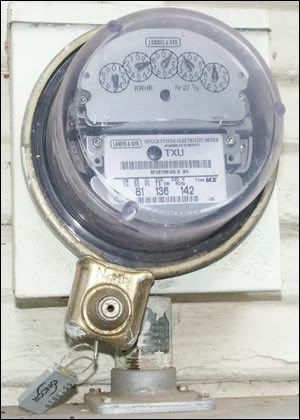Hey... there's your niche market!
With the right skills, you can compete with YESCO for the number of trucks on the street!
I doubt it!
Hey... there's your niche market!
With the right skills, you can compete with YESCO for the number of trucks on the street!
Unless you are wearing the proper PPE, the face sheild turns into an arc scoop if you turn your head away.

Broken parts in the meter socket, or them breaking as you attempt to remove the meter.Assuming there is no load, i.e. all of the breakers in the panel are in the open position, what is the potential for arcing when removing or installing a residential meter?
Broken parts in the meter socket, or them breaking as you attempt to remove the meter.
Keeping in mind there's nothing between you and Hoover Dam to turn the power off automatically.....
besides the cutouts on the poles protecting the transformers
Cutouts on the poles DO NOT protect the transformers, they protect the primary lines from a failed transformer. For instance, we use a 15 T primary fuse to protect a 15 kVA transformer on a 7.62 kV to neutral line. A 15 T medium voltage fuse will carry 150% of its rated current indefinitely. Therefore, 15 A X 150% X 7.62 kV = 171.45 kVA . . . HMMM. That is a lot of overload to pop the fuse so it will only open under fault conditions and will only protect the primary lines to keep as many customers in service as possible.besides the cutouts on the poles protecting the transformers
Since they have the key, won't they pull the meter?I have always found it puzzling on a service change out that Edison wants you to pull the meter do the hot work ( where a lot of guys are not trained in) and they wont give you a key for the lock ring on the meter. . .
Nor should they give you a key. When was the last time you went into any store with a cash register and they let you open the cash drawer to get your own change? That meter is our cash register.. . . they wont give you a key for the lock ring on the meter. . .
The procedure should be in writing somewhere. I suspect the field people want it done that way to keep from making multiple trips. If you were able to get it in writing, I doubt you are supposed to be pulling or setting the meter. Therefore, you are supposed to be doing the work dead.. . . I've never seen any requirement from Edison written on any form that this is the way it's done. It's just the way its done. . .
Ultimately, you are. You are the qualified person who is responsible for following the OSHA rules and what is in NFPA 70E.. . . who is responsible if something goes wrong?
Since they have the key, won't they pull the meter?
Nor should they give you a key. When was the last time you went into any store with a cash register and they let you open the cash drawer to get your own change? That meter is our cash register.
The procedure should be in writing somewhere. I suspect the field people want it done that way to keep from making multiple trips. If you were able to get it in writing, I doubt you are supposed to be pulling or setting the meter. Therefore, you are supposed to be doing the work dead.
Ultimately, you are. You are the qualified person who is responsible for following the OSHA rules and what is in NFPA 70E.
Never have to contend with one of these brutes?

So when I go to cut my hot conductors before the service head. What must I be wearing? and where do I buy it? and for how much? I will be doing a service in about 2 weeks and I want to be looking extra qualified, and alive thereafter.
I don't think that the user of the meter puller has the proper PPE for that job. I would expect that he needs more flash protection as there is no overcurrent protection on the line side of that meter.That's pretty spiffy. Beats close your eyes and pray.
I don't think that the user of the meter puller has the proper PPE for that job. I would expect that he needs more flash protection as there is no overcurrent protection on the line side of that meter.
If the main disco is open, what on earth would explode from pulling a meter?I have had the joy of two meter explosions on service changes...
